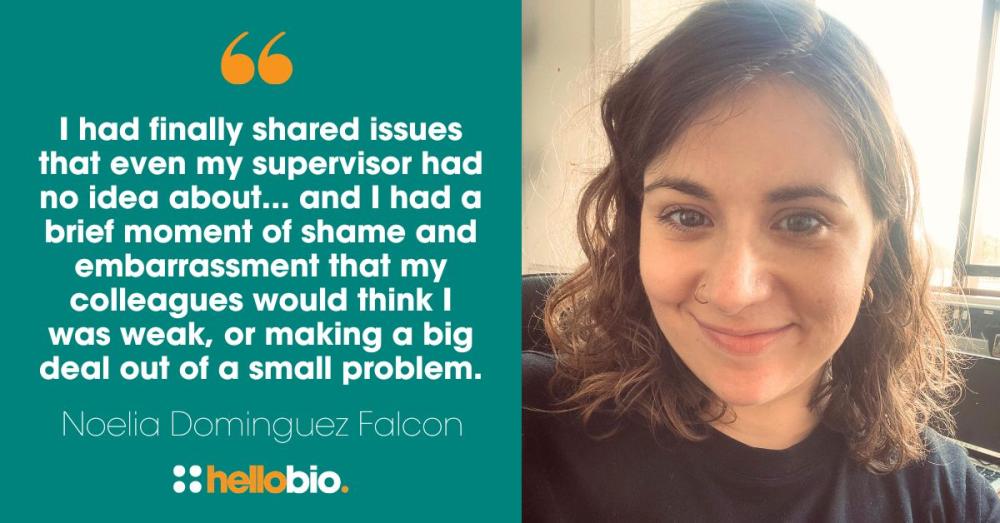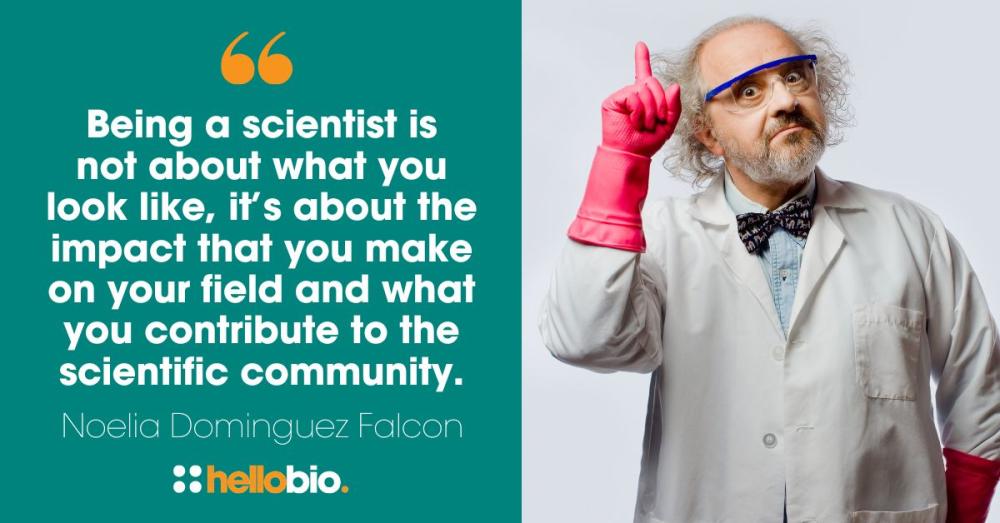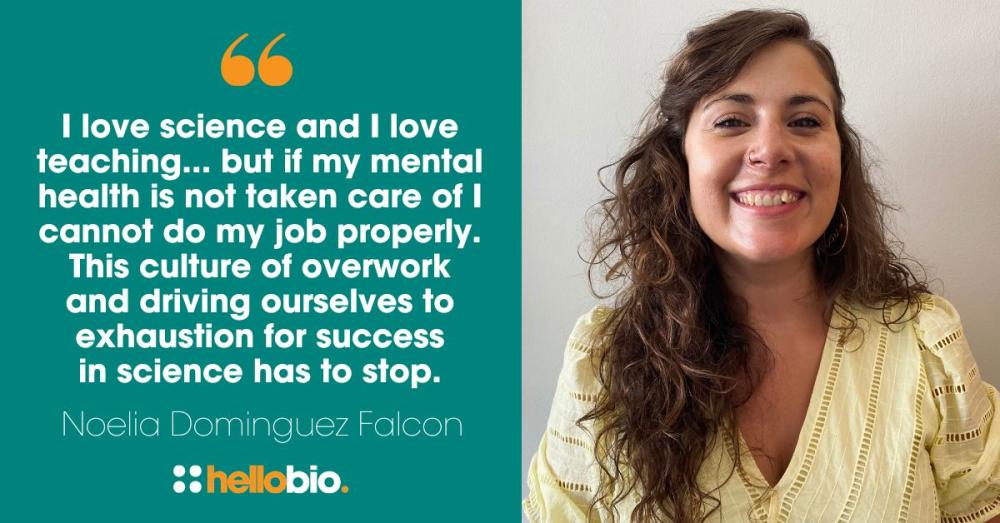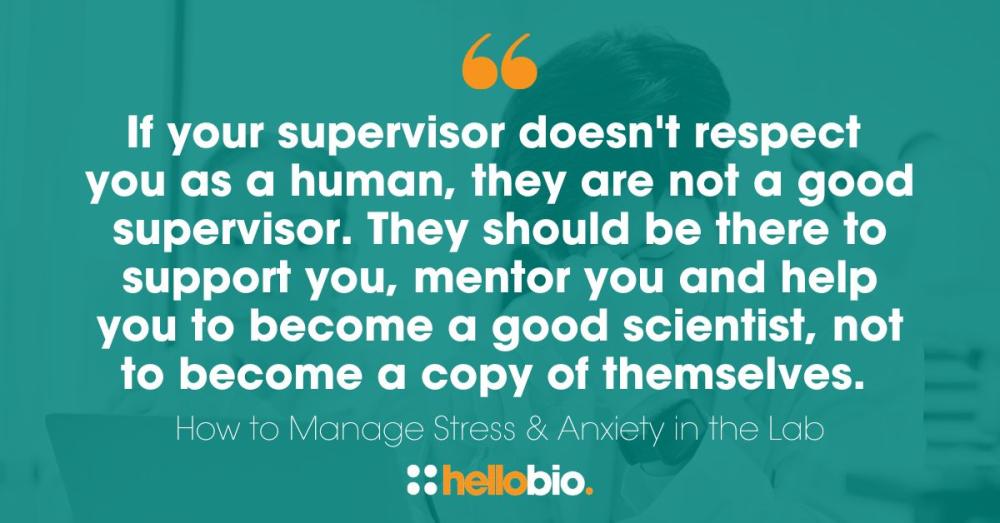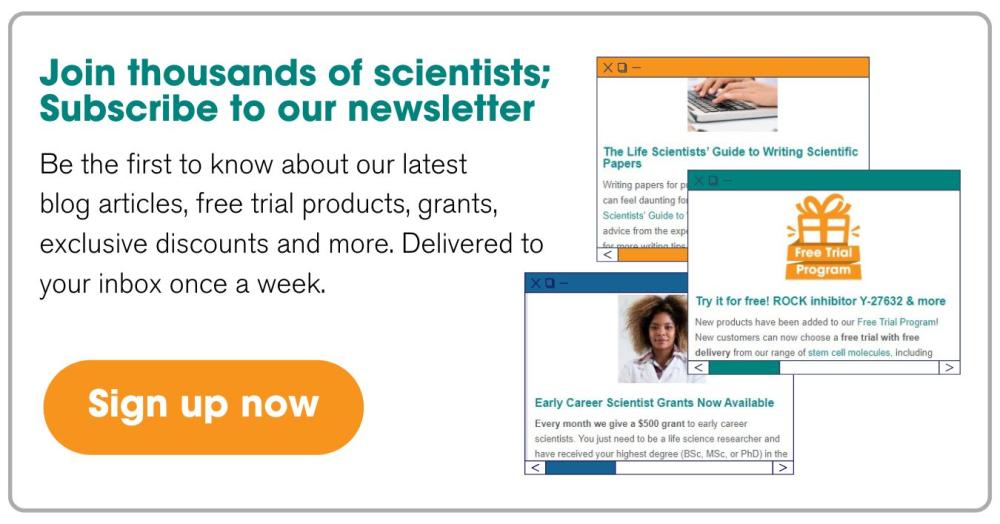How to Manage Stress & Anxiety in the Lab
For many years there has been a growing recognition of a mental health crisis in academia. The intensity of research work brings with it a unique set of pressures and challenges, yet few people are open and honest about their experiences. With difficult access to funding and the constant pressure to publish papers, the physical and mental health of a working scientist can be stretched to the point of burnout.
But it’s time things changed and it’s time we talked more! Mental health is a personal experience so there is no ‘one-size fits all’ advice, but through this article I hope to share some of my own personal experiences and offer advice and tips for managing stress and anxiety in the lab. I hope it serves as inspiration to others, and sparks conversations between colleagues that contribute towards a culture change that is so desperately needed.
Why don’t scientists talk about mental health?
Despite the prevalence of mental health issues amongst busy scientists, it’s still something that is not talked about openly enough. So why are researchers so reluctant to discuss their inner well being with others? The competitive nature of academic research is a common factor, as well as the stigma and expectation of ‘resilience’ amongst successful science professionals.
Personally, I never talked about stress or mental health matters before my PhD. Previous to this I was working as a research technician, and there was a certain culture that required staff to be in the lab working constantly. Although it wasn’t something that was said out loud, there was an air of expectation to work overtime (oh… you’re going home at 5pm?!) in order to be the ‘most’ dedicated or the ‘best’ scientist in the lab. At the time I didn’t realise how toxic this culture was, and it’s only now that I am educating students myself that I see how damaging that way of working can be.
During my PhD studies was the first time I really began to notice the true effects of anxiety and stress amongst myself and my colleagues. There was one particular week that I noticed on every floor of the building that I worked, in every corridor almost, someone was panicking, running, rushing to be somewhere, to meet a deadline, close to breaking down from the strain, and I took a moment to myself to consider… why is everyone so stressed? Why are we all feeling so down?
Around that time, I had been interviewed by Hello Bio about my podcast, and they had approached me again to write an article for their blog on any topic of my choosing. I took this opportunity to talk for the first time about my experiences of mental health challenges, and I wrote very openly and honestly. So honest in fact that once it was published I wondered - should I really have said all that? I had finally shared issues that even my supervisor had no idea about at the time, and I had a brief moment of shame and embarrassment that my colleagues would think I was weak, or making a big deal out of a small problem. But I realised that this is the stigma that is taught to us early on, and that it must be broken if we are to recognise these problems and take action before they take over our lives. The article went on to have almost 7,000 views, and I’m proud that people have read and related to my experiences. It’s important to remember that simply talking or writing about mental health can help and inspire others.
You can read that article here: Under Pressure: Breaking Free from the Stress of Your PhD
The trouble with academia
So what is it about academia that puts so much pressure on those who work within it? What are the aspects that make life so stressful for scientists and researchers? Let’s take a closer look at some of the most common issues:
1. The ‘publish or perish’ culture
A high level of competition amongst researchers means that there is a huge amount of pressure to publish papers quickly and often in order to be ‘successful’ as a scientist. If you’re not seen to be featured in the best journals or doing groundbreaking work, there’s a belief that you’ll be overlooked for the best roles or will never be recognised as ‘someone’ in science. This level of pressure and expectation is unhealthy and difficult to maintain.
2. Instability and insecurity
Academic roles are often accompanied by lower salaries and a great deal of job uncertainty due to scarcity of funding opportunities. Working in an insecure environment means it can be hard to plan and make decisions about your future and the direction you wish to take.
3. Poor work-life balance
The expectation to work long hours and ‘go the extra mile’ for science can lead to an unhealthy lifestyle and a neglect of personal care and overall happiness.
4. Family constraints
Moving cities or even countries for a great job opportunity can disrupt family life, create problems within relationships and often delay big life plans such as getting married, buying a house or starting a family.
Stereotypes & stigmas
Within science research there are extra stereotypes and stigmas which can create problems for those seeking to pursue a career within the field. When the public are asked to describe what a ‘typical’ scientist looks like, for many years the most common description has been that of an older, male character with crazy hair, maybe resembling Albert Einstein, who is cooking up all kinds of colourful potions in a chaotic lab. Also, the work of a scientist is commonly thought of as difficult and disciplined, and one of the many reasons we don’t talk so much about our mental health is that there is an expectation for us to ‘battle’ through it. These stereotypes are often instilled at an early age, and if we want things to change we need to educate the next generation differently. Being a scientist is not about what you look like, it’s about the impact that you make on your field and what you contribute to the scientific community. Yes, the work is challenging, but this should not automatically mean that we all simply keep our heads down and don’t take time out to talk about the issues that matter.
Common mental health challenges in STEM
So what are the most common mental health challenges faced by researchers working in STEM? Here I will discuss the three issues that have affected me the most, how they have impacted my life and work, and my tips for recognising and dealing with them effectively:
Imposter Syndrome
One of the first issues I encountered during my PhD, and to be honest it still follows me today, even as a lecturer, is imposter syndrome. The feeling that you are a fraud, that you are only enjoying success because you ‘got lucky’ is a common one among researchers at all levels. I’ve been suffering with imposter syndrome my entire career, and a particularly memorable example was that of my PhD viva. I had done well with barely any corrections. I had written a 400-page thesis which my examiner told me was ‘incredible’. Yet still, after my viva success, I was understating this achievement and doubting the integrity of the result. We are our worst critics and it can be mentally exhausting when we are constantly questioning our own abilities. But it is so common, and even professors after years and years of teaching will have doubts about their ability in certain situations.
My solution to imposter syndrome? Use it to your advantage! I always try to ‘talk’ to my imposter syndrome and confront it head on. Sometimes we become obsessed with the minor negative details instead of looking at the bigger more positive picture. If something is making you doubt yourself as a scientist, look for the evidence. Ask yourself, has someone actually said these things aloud to me? Has something been written somewhere about my lack of ability? Where are these thoughts coming from? If there is no physical evidence to support these thoughts, don’t give them any more of your time or emotional energy. Use that time instead to become ‘at peace’ with your feelings.
Another technique I found helpful during my PhD was to keep two different journals - a happy or ‘sunshine’ journal, and a sad journal. In my happy journal I would keep nice emails, encouraging text messages, all the things that made me smile and reinforced the positive side of my research work. Even now I still put aside nice comments from students about a lecture I delivered or an assignment I offered support with. It can be a hand-written book or a copied and pasted Excel spreadsheet - it doesn’t matter! And when thoughts of imposter syndrome begin to creep in you can refer to that journal and ask yourself, if I’m really not good enough, if I’m only here because I got lucky, why do all these people think otherwise? They have no reason to lie to you or fake anything. Take those positive comments and use them to override the negative thoughts. But with all this positivity, why do I need to keep a sad journal? Well this is where I write sentences that describe my intrusive thoughts, and I will review them every couple of months to look for any patterns that are repeating themselves. If I notice the same words or sentences repeating often, I know that my brain has got into a routine of trying to convince me of things that I’m concerned or scared about, and they are probably not true!
Top tips for dealing with imposter syndrome:
- Don’t focus on minor details, always look at the bigger picture
- Look for ‘evidence’ of your negative thoughts - you probably won’t find any!
- Take time to be at peace with yourself
- Keep a “sunshine” journal as well as a “sad” journal
Overworking
Another problem that I encountered during my PhD, and something I still do now sometimes, is the tendency to overwork. When I began my first job role in the UK, I was consistently working weekends. I can’t recall a weekend when I did not work in the lab. I was working bank holidays, missing vacations, trips home to Spain, weekend activities with my friends, etc. all because the culture I was working in made me believe I needed to produce lots of data, publish lots of papers, get a great promotion, and secure the next grant. Pressure came from all angles and it took me a long time to realise that I did not need to ‘keep up’ with anyone else. We are all different and we all walk our own path. Yes we might have goals that we are working towards, but it should not mean that we sacrifice our personal lives in order to achieve them. I love science and I love teaching. It truly fulfils me, but if my mental health is not taken care of I cannot do my job properly. This culture of overwork and driving ourselves to exhaustion for success in science has to stop. I love science but it is not my whole life, and it took me almost a decade to realise this.
Top tips for avoiding overwork and burnout:
- Don’t compete with others, we are all different and we walk our own path
- Listen to your body - recognise when signs of exhaustion are showing
- Connect with people and hobbies outside of work that make you happy
Dealing with grief
All of us experience grief at some point in our lives and it is a sensitive topic that can be very difficult to talk about. People will have different ways of handling grief, and taking time out to deal with your emotions is very important. However, this is not always the easiest decision to make, and if you are working in an environment where overwork is encouraged, or even celebrated, avoiding your grief can lead to burnout or breakdown.
For me personally, I experienced the loss of a loved one just a week before starting my PhD. My grandmother, who was as close as a mother to me, passed away over the Christmas break and I did not have time to process anything. I packed my bags and headed straight back to work, choosing to avoid my feelings and throw myself into overwork. I buried myself in work 24/7. I told myself that I had waited so long to start my PhD, that I couldn’t possibly take time off, I could not fail - what kind of student would I be? I told myself that my supervisor would not allow it, even though my supervisor actually had no idea at all what I was going through. I was working every Saturday, every Sunday, staying until 8pm every night to the point that I burned myself out. Things got so bad that I had to force myself to seek professional help.
We all deal with grief differently, but my main piece of advice would be to seek help and support from anyone who you feel comfortable sharing your emotions with. It could be a friend, a colleague, a supervisor - keeping these thoughts to yourself will almost always lead to worse emotions further down the line. Your research is important to you, but you must prioritise yourself, listen to your body, and trust the grieving process. It took me a few years to be able to talk about this openly, but by sharing what you’re going through you can not only help yourself, but others too.
Top tips for dealing with grief in the workplace:
- Don’t prioritise work or achievements over your mental health
- Seek help and support from someone you trust
- Put yourself first and always listen to your body
- Talk as openly and honestly as possible - it’s hard but it helps
Setting healthy boundaries
To give yourself the best chance of maintaining a good level of mental health in any job role it’s important to set boundaries from day one. Be honest and clear with your supervisor about expectations regarding working hours, and similar factors such as whether email or text communication outside of work hours is acceptable to you. It may feel daunting to approach these matters immediately when starting out in a new role, as you won’t want to ‘rock the boat’ or make a bad first impression, but it is necessary, and a good supervisor should respect your request.
When I started as a lecturer, one of the first things I did was to inform my students that unless they were in an emergency situation, I would not be replying to any emails in the evenings or on the weekends. At first it felt rude, and this may not have been what the students hoped or expected to hear from me. But at the same time I needed to respect myself and my own needs, because if I’m too stressed to give lectures, or too burned out to go to work at all, it is my students who will suffer.
If your supervisor doesn't respect you as a human, they are not a good supervisor. They should be there to support you, mentor you and help you to become a good scientist, not to become a copy of themselves. I have seen so many PhD students break down with the pressure of work, and although it’s something you are passionate about, it should never be making you ill. So be sure to clarify those boundaries as soon as you can.
And remember...
You are the most important piece of the puzzle that is your life, and if you don’t take care of yourself, you can’t do great science! No matter the situation you are in or the experience you are going through, your feelings are valid and your emotions should always be respected - by others and by you.
When times are tough, focus on the things that make you smile, such as a fun hobby, time spent with good friends, or a peaceful place that you can go to to take your mind away from the stress and anxiety of the workplace.
Mental health issues are usually associated with a body response, so don’t ignore what your body is telling you. Our bodies are smarter than we realise and when we learn to recognise and identify patterns of behaviour we can look out for ourselves and others, and ultimately we will make healthier decisions. Nurture your inner self and discover what you need to learn and grow.
Your life is about YOU, not others. Only when we are capable of understanding and respecting ourselves can we offer support to others. Once we can all do this, we can break the cycle and stigma of mental health problems in science, and with a collective effort, toxic culture can be eliminated and the system will change for the better.
---------------------------------------------------------------------
Watch Noelia's talk at the Hello Bio LabLife Conference 2024
This article is based on Noelia's talk entitled 'How to Manage Stress & Anxiety in the Lab' at the Hello Bio LabLife Conference on 18th January 2024. You can watch the full video plus audience Q&A session with Bronwen on the Hello Bio YouTube channel:
About the author
Dr Noelia Dominguez Falcon is a Lecturer in Biomedicine and Social Media Officer at the School of Biological Sciences, University of East Anglia (Norwich, UK). After completing her undergraduate and master's studies in her home country Spain, Noelia moved to Norwich in 2015, having spent the past nine years working in different fields such as molecular biology, stem cell biology, and tissue engineering. She dedicates her spare time to outreach activities, women in STEMM advocacies, and student mentorship.
Read more articles by Noelia on the Hello Bio blog:
- Interviews with Scientists: Noelia Dominguez Falcon
- Podcasts by Scientists: I Belong Here
- Under Pressure: Breaking Free from the Stress of Your PhD
- The Recipe for Sweet PhD Success - Part 1
- The Recipe for Sweet PhD Success - Part 2
Connect with Noelia:
- X(Twitter): @_Noelitaa / @BelongPodcast
- LinkedIn: Dr Noelia Pilar Domínguez Falcón
- Instagram: @manzanicahelada
More useful articles on the Hello Bio blog
For more advice on mental health and well being in the lab, check out some of these other great resources on the Hello Bio blog:
- The Life Scientists' Guide to Wellbeing
- The Life Scientists' Guide to Coping With Rejection
- Identifying & Dealing with Burnout in Academia
- Workplace Wellbeing for Life Scientists
- Ten Ways for Scientists to Achieve a Better Work-Life Balance
- Failure, Resilience and Overcoming Imposter Syndrome
- Dealing With Feelings of Inadequacy During Your Research Career
- Getting Accustomed to Rejection
- How to Manage the Expected Pace of Work in Scientific Research
- Building Resilience in Scientific Research & Academia
- Mental Health & Wellbeing for Scientists: Support Pack
________________________________
If you enjoyed this article, why not check out the other resources available on our blog. We are passionate about supporting life scientists including early career life scientists and PhD students - with really low-priced reagents, antibodies and biochemicals, early career scientist grants, and resources to help with both personal and professional development. We know how tough it is - so we hope you find these helpful!
More General Support for Life Scientists
For advice on wellbeing, dissertations, presenting at conferences, wellbeing, PhD support, networking and lots more, we have a huge range of articles to help - just click below:
Save up to 50% on our high purity reagents...
When you get to the stage of planning your experiments, don't forget that we offer a range of low-cost, high-purity agonists, antagonists, inhibitors, activators, antibodies and fluorescent tools (yes - they really are around half the price of other suppliers!) You can use our Quick Multi-Search Tool to search for lots of products in one go, and the range includes:
- Enzyme inhibitors and activators
- Chemogenetic ligands
- Ion channel modulators
- GPCR & ionotropic receptor ligands
- Cell biology reagents & biochemicals
Technical resources
Try our Molarity Calculator: a quick and easy way to calculate the mass, volume or concentration required for making a solution.
Try our Dilution Calculator: an easy way to work out how to dilute stock solutions of known concentrations
We also offer a comprehensive range of technical resources including antibody protocols and methods, product guides and mini-reviews:
And finally, don't forget to check back in with our blog regularly for our latest articles. If there’s something you’d love to contribute to the community, whether that’s an interview or article, drop us a line at hello@hellobio.com
---






